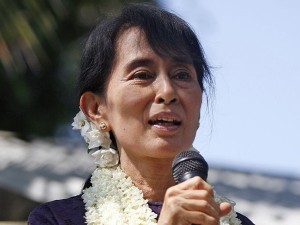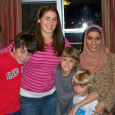
Photograph by Htoo Tay Zar
“We are in the presence of greatness,” announced an ebullient Congressman Joseph Crowley to a roomful of dignitaries, celebrities and activists who had gathered to hear Burmese opposition leader Daw Aung San Suu Kyi on her first visit to the U.S. after nearly two decades of enforced isolation in Rangoon.
To me, Crowley’s statement was not hyperbolic. For almost twenty years as a professional in the field of human rights, I had looked upon “The Lady,” as Suu Kyi is oft-referred, as the personification of moral leadership in our time. Nothing short of a role model on the scale of Gandhi and Martin Luther King. After years of assuming I would never have the opportunity to see her in person, there I was on the campus of Queens College in New York early on a Saturday morning to simply soak in her presence.
Suu Kyi’s U.S. tour has been a victory lap. On this morning, Speaker Christine Quinn presented her with a citation from the New York City Council. Musician Carole King serenaded her, customizing the words to her well-known song, “Daw Suu Kyi, you’ve got a friend!” while actress Angelica Huston read from Suu Kyi’s essay “Freedom from Fear.”
Most memorable for me, however, was the strong under-current of sound advice for raising the next generation of global citizens with duty, discipline and, yes, even love…
On being a responsible citizen: Teaching young people not to take their rights for granted is absolutely essential, Suu Kyi said. During her years living in England while her late husband taught at Oxford, Suu Kyi would frequently challenge friends who didn’t vote in the strongest of terms. “It seemed to me such a waste of an opportunity. Also a lack of respect for a right that you should guard with your very life. You must vote. You must use your democratic rights. Otherwise, they will fade away.”
On the importance of discipline (and rest): For fifteen of the past 21 years, Suu Kyi lived under house arrest. During that time she thrived on discipline. “From day one I set myself a very strict timetable,”she said. She meditated for an hour each morning, followed by exercise, reading and listening to the radio. Then she set to work. “Except on the weekends, when I rested, which is important for everyone.”
On unconditional love: Although her father, General Aung San, considered the father of modern day Burma, was assassinated when Suu Kyi was just 2, she had always sensed that she had been his favorite. “To all the parents in the room — really, this is important for everyone — any child who feels they have been truly loved, even by just one person, will develop tremendous confidence.”
There is much more to be said about Burma and Aung San Suu Kyi’s role in its nascent democracy. But on a day designed for reflection and celebration, I hope you, too, find encouragement in her example and her words.





